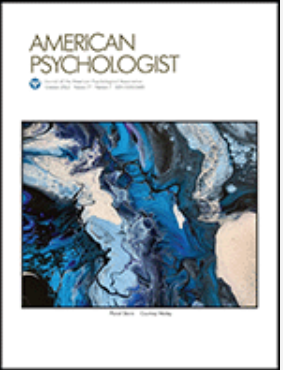白人≠欧洲人(美国人):对美国心理学协会更新的《包容性语言指南》的评论。
IF 12.3
1区 心理学
Q1 PSYCHOLOGY, MULTIDISCIPLINARY
引用次数: 0
摘要
美国心理学会(APA)于 2023 年底发布了第二版《包容性语言指南》。该指南与上一版相比没有更新的一个方面是,建议作者在 "撰写关于欧洲血统的人 "时使用 "白人 "或 "欧洲人(国籍)"。在这篇评论中,我们认为 "白人 "和 "欧洲人 "或 "欧美人 "等词语不能或不应该互换使用。虽然大多数被种族化为白人的人都有欧洲血统,但对他们的机会和经历影响最大的通常不是他们的种族遗产,而是他们对白人身份的认知和归属。无论研究主题如何,使用 "欧洲人(美国人)"而非 "白人 "一词都会掩盖白种人的身份,以及系统性种族主义在塑造所有人(包括那些被种族化为白人的人)生活中所起的相应作用。此外,交替使用 "白人 "和 "欧洲人(美国人)"这两个词意味着只有被种族化为白人的人才能成为欧洲人,从而掩盖了数百万有色人种欧洲人的历史和现实。将 "欧洲人 "仅限于那些被种族化为白人的人的标签使 "他者化 "永久化,并维护了一种等级制度,即白人是 "欧洲人 "唯一可接受的体现。随着种族主义在欧洲的抬头,研究人员必须认识到我们所使用的语言的力量。我们建议 APA 和遵循 APA 风格的学者考虑这些术语的含义,不要交替使用这些术语,因为这样做会强化全球范围内的不平等。(PsycInfo 数据库记录 (c) 2024 APA,保留所有权利)。本文章由计算机程序翻译,如有差异,请以英文原文为准。
White ≠ European (American): Commentary on the American Psychological Association's updated Inclusive Language Guide.
The American Psychological Association (APA) released the second edition of the Inclusive Language Guide in late 2023. One aspect of this guide that was not updated from the previous version was the recommendation for authors to use either "White" or "European (nationality)" when "writing about people of European ancestry." In this commentary, we argue that "white" and "European" or "European American," for instance, are not terms that can or should be used interchangeably. Although most individuals racialized as white have European ancestry, it is generally not their ethnic heritage that is most impactful for their opportunities and experiences, but their perceived and ascribed inclusion in whiteness. Regardless of the research topic, employing the term "European (American)" rather than "white" obscures whiteness and the concomitant role of systemic racism shaping the lives of all individuals, including those racialized as white. Moreover, using the terms "white" and "European (American)" interchangeably implies that only people racialized as white can be European, masking the history and current reality of millions of Europeans of color. Labels that limit being European to those racialized as white perpetuate othering and uphold a hierarchy where being white is the only acceptable embodiment of being European. With racism on the rise in Europe, it is important for researchers to recognize the power of the language we use. We suggest that APA and scholars following APA style consider the implications of these terms and not use them interchangeably, as doing so reinforces inequity across the globe. (PsycInfo Database Record (c) 2024 APA, all rights reserved).
求助全文
通过发布文献求助,成功后即可免费获取论文全文。
去求助
来源期刊

American Psychologist
PSYCHOLOGY, MULTIDISCIPLINARY-
CiteScore
18.50
自引率
1.20%
发文量
145
期刊介绍:
Established in 1946, American Psychologist® is the flagship peer-reviewed scholarly journal of the American Psychological Association. It publishes high-impact papers of broad interest, including empirical reports, meta-analyses, and scholarly reviews, covering psychological science, practice, education, and policy. Articles often address issues of national and international significance within the field of psychology and its relationship to society. Published in an accessible style, contributions in American Psychologist are designed to be understood by both psychologists and the general public.
 求助内容:
求助内容: 应助结果提醒方式:
应助结果提醒方式:


